 Monday, July 7th, 2025
Monday, July 7th, 2025
What a day! Today! July 7th, 2025. Not only is it the start of the fiesta de Sanfermines in Pamplona, it's also the 20th anniversary of the London Bombings, when four suicide bombers attacked three underground trains and a London bus during the morning rush hour.
While the encierro in northern Spain is a joyous occasion, the events in London represented a colossal outrage.
[Image courtesy of WinCalendar]
Introduction
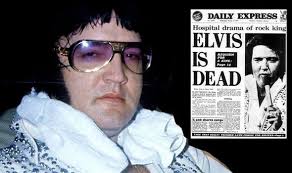 There are certain events, like the assassination of JFK in Dallas, Texas, in 1963, the death of Elvis Presley in 1978, the Lockerbie air disaster in 1988, the Twin Towers abomination in 2001, the Madrid bombings in 2004, where you know exactly where you were when it happened.
There are certain events, like the assassination of JFK in Dallas, Texas, in 1963, the death of Elvis Presley in 1978, the Lockerbie air disaster in 1988, the Twin Towers abomination in 2001, the Madrid bombings in 2004, where you know exactly where you were when it happened.
Elvis dead [Daily Express]
In the case of the London bombings, I was sitting in Palmyra Square, Warrington, Cheshire, with my daughter Amy who was home after her first year at university.
We were shocked beyond belief. Amy was particularly concerned for some of her friends, who were from London.
July 7th, London, England
This was widely reported in the media. One of the best accounts was published by The Museum of London.
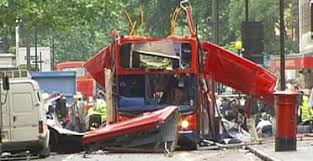 The 7/7 London bombings, 2005
The 7/7 London bombings, 2005
On the morning of 7 July 2005, four suicide bombers detonated their devices on London Underground trains and a double-decker bus, killing 52 people and injuring hundreds more.
[Photo: The Guardian]
21st-century terror
On 7 July 2005, the peace of a summer’s day in London was shattered by the first ever suicide bombings on English soil.
The attack targeted innocent commuters in the morning rush hour. Some still glowed with the news of the day before – the announcement that London would host the 2012 Olympic Games.
Motivated by extreme Islamist ideas, the attacks spread fear and anxiety. Muslims suffered increased Islamophobia. But there was also resilience – a determination not to let the attacks divide this diverse city.
While Londoners continued with their lives, they didn’t forget the victims of the attacks and created lasting memorials in their honour.
Where were the 7/7 London bombings?
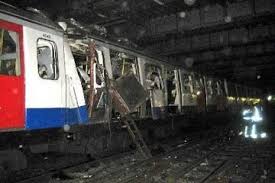 Just before 9am, three suicide bombers carrying explosives in rucksacks detonated their devices independently on London Underground trains travelling through inner London.
Just before 9am, three suicide bombers carrying explosives in rucksacks detonated their devices independently on London Underground trains travelling through inner London.
One exploded between Liverpool Street and Aldgate. Another detonated between Edgware Road and Paddington. The most deadly explosion came between King’s Cross St Pancras and Russell Square, killing 26 people.
Roughly an hour after the first explosions, a fourth bomb was detonated on a London bus at Tavistock Square, killing a further 13 people.
[Photo: The Times]
Bloodied and dazed commuters emerged from the tunnels, helped by emergency workers. The London Underground network was closed, and almost all buses were suspended.
Surreal scenes followed as tens of thousands of Londoners spilled onto the street, confused by the lack of information and struggling to make their way home.
Mobile networks went down, unable to cope with the surge in calls as people tried to contact loved ones. Meanwhile, authorities desperately tried to piece together what had happened.
How many people died on 7/7?
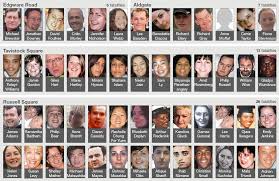 A total of 52 people were killed. More than 700 were injured, some losing limbs. The mental scars run further, still affecting passengers and the members of the emergency services who reacted.
A total of 52 people were killed. More than 700 were injured, some losing limbs. The mental scars run further, still affecting passengers and the members of the emergency services who reacted.
The victims were typical of those who crowd onto buses and the Tube every day. The majority were born in the UK, but there were also many people from other countries, including Poland, Vietnam, Ghana, Mauritius and Turkey.
Each with a plan for their morning, their evening, their week.
[Photo Montage: BBC]
There were also inspiring stories of heroism and survival. Martine Wright lost both her legs, but went on to compete in the London 2012 Paralympic Games.
Honouring the dead
In our collection [at the London Museum], there’s a book of tributes by the families and friends of the 52 people who were killed. Inside, they share their intimate memories of those they lost, hoping to preserve some part of their spirit.
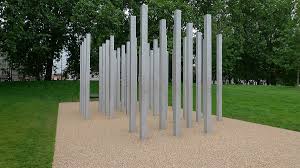 The book was previously held at St Ethelburga’s Centre for Peace and Reconciliation in Bishopsgate, where it was a focal point for visitors paying their respects.
The book was previously held at St Ethelburga’s Centre for Peace and Reconciliation in Bishopsgate, where it was a focal point for visitors paying their respects.
Those who died are also commemorated at a permanent memorial in Hyde Park, where 52 steel pillars are arranged in clusters representing the four locations of the attacks.
[Hyde Park memorial: Wikipedia]
Who were the suicide bombers?
 The bombers were British men who began their journeys on 7 July from their homes in West Yorkshire and Luton. Their British nationality meant they were labelled as ‘home-grown’ terrorists.
The bombers were British men who began their journeys on 7 July from their homes in West Yorkshire and Luton. Their British nationality meant they were labelled as ‘home-grown’ terrorists.
The July 7th suicide bombers [BBC]
All four were killed by their homemade explosives, just as they’d planned. The bombers were inspired by the militant Islamist group al-Qaeda, who were linked to the Madrid train bombings in 2004, the 9/11 attacks in New York in 2001 and the 1998 bombings in Kenya and Tanzania.
Al-Qaeda’s ideology pitted it against the US and its allies – including the UK – for their presence in the Middle East and the wars they’d fought in Iraq and Afghanistan.
***
Sanfermines 2025
 "Uno de enero, dos de febrero, tres de marzo, cuatro de abril, cinco de mayo, seis de junio, siete de julio, San Fermin ....."
"Uno de enero, dos de febrero, tres de marzo, cuatro de abril, cinco de mayo, seis de junio, siete de julio, San Fermin ....."
The annual bull-running in Pamplona as a prelude to that afternoon's corrida de toros (bullfight) was popularised by the US journalist and writer Ernest Hemingway.
Nowadays, many thousands of visitors from around the world descend on the capital of Navarra to either take part or to observe.
I went two years running in my early twenties. I didn't run - too scary - but enjoyed the bullfights and even saw the great Paquirri as a debutant.
[Poster courtesy of Sanfermin.com]
The first encierro started at 07.15 this morning. You can view it here:
Vive San Fermín 2025 | Todos los programas de los encierros
Other links:
7 de julio – SAN FERMIN
7 de julio – San Fermín
“ ….. Siete de julio, San Fermin ….”
Sources:
BBC, Britannica, London Museum, RTE, RTVE, Wikipedia, www.eye-on-spain.com
Links:
The 7/7 London bombings, 2005 | London Museum
Vive San Fermín 2025 | Todos los programas de los encierros
© Pablo de Ronda
Photos and Images:
BBC, Daily Express, Guardian, London Museum, RTVE, Sanfermin.com, The Times, Wikipedia
With thanks to:
BBC, London Museum, Paul Whitelock, RTVE, The Culture Vulture, Wikipedia
Tags:
7/7, 9/11, Aldgate, al-Qaeda, assassination, BBC, Britannica, Cheshire, corrida de toros, Daily Express, Dallas, Edgware Road, Elvis Presley, encierro, Guardian, JFK, King’s Cross St Pancras, Liverpool Street, Lockerbie, London bus, London Museum, Madrid train bombings, New York, Paddington, Palmyra Square, pamplona, PanAm flight 103, Paul Whitelock, RTE, RTVE, Russell Square, San Fermin, Sanfermines, "siete de julio", Tavistock Square, The Culture Vulture, The Times, Twin Towers, "Uno de enero", Warrington, Wikipedia